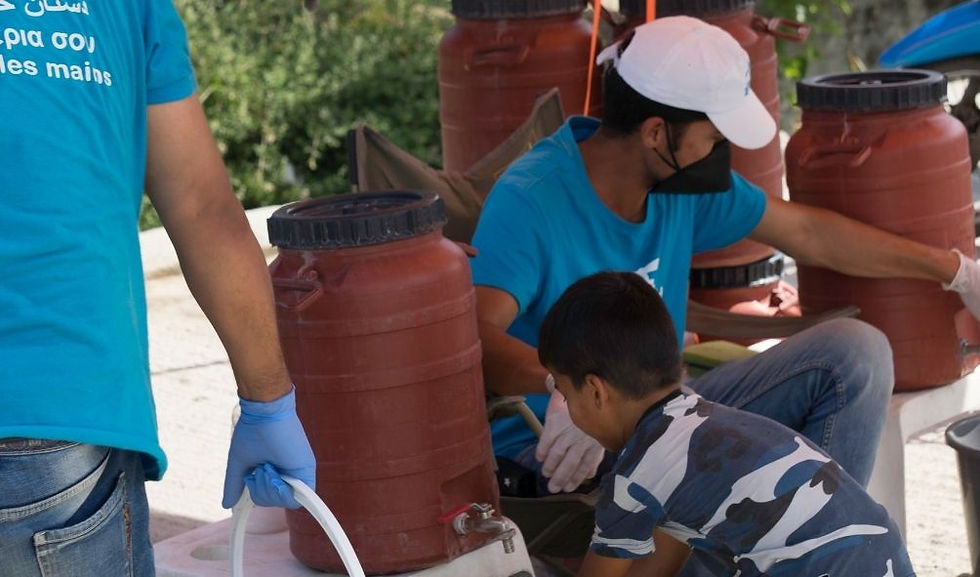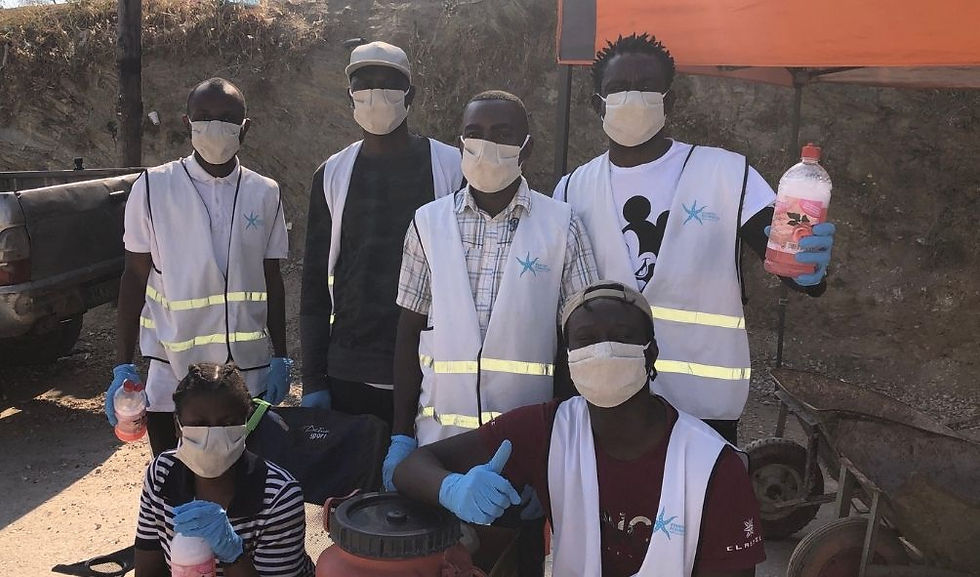An introduction to #SafeHands
- asterias-starfish
- Jan 14, 2021
- 7 min read
Updated: Mar 2, 2021
On March 11, 2020 the World changed.
That was the day the WHO Secretary General, Dr Tedros Adhanom Ghebreyesus, announced that the coronavirus outbreak sweeping the world was now officially a pandemic.
By then the virus had made its way from Wuhan in China to nearly every part of the globe. Greece recorded its first case on February 26 when a 38-year-old woman was confirmed as having covid-19 after returning to Thessaloniki from Italy.
Public health authorities redoubled their efforts to educate the population about how to prevent the transmission of the virus – social distancing – and of course hand washing.
For the residents of Moria refugee camp all the recommended measures were almost impossible to take. In March 2020, access to clean water for the nearly 22,000 residents living at the camp and immediate area was severely limited. Regular hand washing was something that would be almost impossible to achieve. Social distancing was never an option for those living inside the official camp as well as the surrounding Olive Groves where people had to wait in line for every basic amenity from toilets to food distribution.
Poor access to basic sanitation, cramped living conditions, bad nutrition all resulted in a population vulnerable to virus spread. As a senior public health official on Lesvos put it at the time, “Moria is a public health timebomb”.
The first case of Covid-19 on Lesvos was recorded on March 9, the patient a local returning to the island.
With the virus on the island a cheap, safe and sustainable solution was needed to provide hand washing facilities to the residents of the Moria camp.
During the Ebola outbreak in West Africa a bucket of clean water and soap had proved to be an effective way of allowing people living in low resource areas to wash their hands, reducing the risk of viral infection. Like a nail popping a tyre, the water-repelling end of the soap molecule breaks up COVID-19 and leaves the virus deflated and broken.
Starfish decided that this could be the answer for Moria camp.
Within days of the pandemic being declared Starfish set up the first wash station outside the main gate to the camp and started the Safehands programme.
Re-purposed 25 litre olive oil barrels, beach stools and liquid soap was all it took.

At first, the station was staffed by only a few volunteers but the numbers grew quickly. Within two weeks Safehands had four wash station and nearly fifty regular resident volunteers.
Initially people were reluctant to come wash their hands but as the days passed and the presence of the wash stations became a familiar sight, more people began to use them.
By the end of May it was estimated that upwards of 2000 people were washing their hands at the Starfish wash stations every day.
Because of the scarcity of clean water at Moria a key goal of the #safehands programme was not to stress the water resources of the camp. Right from the beginning, Safehands found a water supply nearby. The Starfish delivery van, normally used for transporting clothes and baby boxes, was refitted to carry a water tank. Each day the van supplied the wash stations with more than 1500 litres of clean water.
As the programme became more established it became clear that we needed to be educating the people about how best to protect themselves and their families. Working with Medicins Sans Frontiers (MSF), we began training all of our volunteers in corona awareness and prevention. The Safehands volunteers became advocates, spreading the message of hand hygiene and answering the questions of their fellow migrants.

MSF conducted COVID- specific medical training for our #SafeHands volunteers
Greece was very successful in its initial response to the pandemic, locking down and putting into place measures to contain the virus. The spread of Covid-19 was limited, especially on Lesvos with only a handful of cases imported from abroad.
But success brought complacency. Migrants and islanders began to doubt the reality of the pandemic, a view spread on social media and by word of mouth in the camp.
By June the volunteers routinely heard people saying that corona was over. In fact, Moria and Lesvos were entering a new dangerous phase of the pandemic. The team had to redouble their efforts to educate the population about the nature of the pandemic and the need to change their behaviour over the long term. Other NGOs like MSF and the International Rescue Committee (IRC) began health promotion programmes in the Olive Grove in an attempt to educate and inform the people.
Again, drawing on lessons from other outbreaks, we began working with the IRC team to introduce an even simpler means of hand washing – tippy taps. Tippy taps are just a water container suspended on a frame. A string from the container leads to a simple wooden pedal which is used to tip the water onto waiting hands. A big bonus was the children loved them.

Working with IRC, Safehands installed more than forty tippy taps into the most remote and inaccessible parts of the Moria encampment. For the first time the people had access to a means of washing their hands. But tippy taps were more than a simple way of hand washing. Like the wash stations they became focal points for educating people about the need for hand hygiene.
The people themselves took ownership of these tippy taps, keeping them supplied with water and topped up with soap provided by the Starfish wash stations.
The next big innovation for the Safehands project was the distribution and recycling of masks. The role masks played in preventing infection had been increasingly recognised as more was learned about the virus.
With social distancing impossible in Moria, mask wearing became another vital strategy to reduce the risk of infection. As part of the overall prevention strategy the Starfish Safehands wash stations became places where the people could come and exchange dirty masks for clean ones.
By the beginning of June the service was up and running. And again we backed up the mask exchange programme with training for our volunteers, training on how to put on and wear masks as well as underlying reasons for needing to use them. Safehands also started distributing masks as part of this service.
In July Greece started easing the lockdown. People began to mix more freely, bars and restaurants opened. As expected, the rate of infection increased.
At the end of July Dr Tedros spoke of how the pandemic is a once-in-century health crisis.
“Many countries that believed they were past the worst are now grappling with new outbreaks. Some that were less affected in the earliest weeks are now seeing escalating numbers of cases and deaths.”
Covid-19 had an impact on the migrants in Moria that extended beyond the potential physiological impact of the disease. There was now an increasingly hostile attitude towards the Moria camp, restrictions on movement and a slowdown in asylum application processing.
The end of July saw a huge setback for those working to prepare Moria camp for the inevitable arrival of Covid-19. MSF had spent the summer building and staffing an isolation facility a short distance from Moria camp. This isolation centre was the only place on Lesvos which could provide a safe space for people from Moria displaying COVID-19 symptoms.
The local authority demanded its closure, fined MSF and threatened criminal charges for breaches of planning regulations. It was like sending the virus an invitation.
Within weeks Corona came back to Lesvos. August saw outbreaks in some of the smaller towns as well as cases in Mytilene. Most of these infections were traced to “super spreader” events at churches and other social gatherings.
It had become clear to everyone involved in Safehands that they were in a marathon, not a sprint. Starfish and Safehands had now become one of the main points of defence against Covid-19 at Moria and indeed Lesvos.
Rumour and gossip flourished in the migrant and local community, not just about Covid-19 but also the future of the Moria camp. The continued lockdown of the asylum seeks – restriction of their movements – and the continued protest by locals added to tension on the island. All this came to a head in September.
On the first of September the Greek Government deployed a large force of new police. At the same time, Greek newspapers reported that the Government had signed contracts to begin fencing in the camp, fulfilling the fear of many that Moria was about to become a closed camp. This would mean the movement of asylum seekers even more severely restricted and controlled.
On Wednesday September 2, the media reported the first positive case of Covid-19 in Moria camp.
Starfish began lobbying hard with both the camp management and the Lesvos police for the Safehands programme to be allowed to continue. With public health officials arriving to start mass testing and contact tracing the police agreed to allow Safehands to operate two wash points.
Many of the migrants did not believe that Covid-19 was real. They saw it as part of a larger conspiracy to remove them from the island and return them to their countries of origin. A coordinated Public Health Education strategy had never been a priority of the authorities or indeed many of the NGOs operating at Moria. The psycho social impact of the virus was underestimated.
Responding to the crisis the camp management pressed into service quarantine facilities, however, on Tuesday 8 September news began to spread of first a disturbance. Eye witnesses claimed that migrants were resisting being moved to the isolation facility. Protesters then “freed” the people already in isolation. Shortly afterwards fires broke out. There had been no rain for months and strong winds fanned the flames.

The fire in Moria camp left 13,000 without shelter
Over the next few days more fires were set, some reportedly by locals’ intent of making sure Moria was closed for ever. Within the space of a few days the camp and the surrounding Olive Grove became uninhabitable. Moria camp was no more.
And with it the Safehands project at Moria camp.
The lack of preparedness for the impact of the coronavirus on Lesvos hopefully will serve to illustrate the importance of underpinning medical and security responses with aggressive education and communication strategies. As we are all learning, the impact of a virus like Covid-19 is more than physiological. Viruses can have long lasting psychological, social and political effects.
Our #SafeHands programme has now restarted in the new “Kara Tepe/RIC Lesvos” camp, with over 70 resident volunteers working to provide clean water, soap, and masks to all those who stop by the stations.



コメント